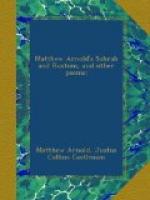THE STRAYED REVELLER
“I have such a love for these forms and this old Greek world, that perhaps I infuse a little soul into my dealings with them, which saves me from being entirely ennuyx, professorial and pedantic.” (Matthew Arnold, in a letter to his sister, dated February, 1858.)
Circe, according to Greek mythology, was an enchantress, who dwelt in the island of AEaea, and who possessed the power to transform men into beasts. (See any mythological text on Ulysses’ wanderings.) In Arnold’s fantastic, visionary poem, the magic potion, by which this transformation is accomplished, affects not the body, but the mind of the youth.
=12. ivy-cinctured.= That is, girdled with ivy, symbolic of Bacchus, the god of wine and revelry, whose forehead was crowned with ivy. See also l. 33. [180]
=36. rout.= Consult dictionary.
=38. Iacchus.= In the Eleusinian mysteries, Bacchus bore the name of Iacchus. =fane.= A temple. From the Latin fanum, a place of worship dedicated to any deity.
=48. The lions sleeping.= As Ulysses’ companions approached Circe’s palace, following their landing on her island, they found themselves “surrounded by lions, tigers, and wolves, not fierce but tamed by Circe’s art, for she was a powerful magician.”
=67. Pan’s flute music!= Pan, the god of pastures and woodlands, was the inventor of the syrinx, or shepherd’s flute, with which he accompanied himself and his followers in the dance.
=71. Ulysses.= The celebrated hero of the Trojan war; also famous for his wanderings. One of his chief adventures, on his return voyage from Troy, was with the enchantress Circe, with whom he tarried a year, forgetful of his faithful wife, Penelope, at home.
=72. Art.= That is, are you. (Now used only in solemn or poetic style.)
=73. range.= Wander aimlessly about.
=74. See what the day brings.= That is, the youth. See ll. 24-52
=81. Nymphs.= Goddesses of the mountains, forests, meadows, or waters, belonging to the lower rank of deities.
=102-107.= Compare in thought with Tennyson’s poem, Ulysses.
=110. The favour’d guest of Circe.= Ulysses. See note, l. 71.
=120. Muses.= Daughters of Jupiter and Minemosyne,
nine in number. According to the earliest writers
the Muses were only the inspiring goddesses of song;
but later they were looked to as the divinities presiding
over the different kinds of poetry, and over the arts
and sciences.
[181]
=130-135.= Note the poet’s device for presenting
a series of mental pictures. Compare with Tennyson’s
plan in his Palace of Art. Does Arnold’s
plan seem more or less mechanical than Tennyson’s?
=135-142. Tiresias.= The blind prophet of =Thebes= (l. 142), the chief city in Boeotia, near the river =Asopus= (l. 138). In his youth, Tiresias unwittingly came upon Athene while she was bathing, and was punished by the loss of sight. As a recompense for this misfortune, the goddess afterward gave him knowledge of future events. The inhabitants of Thebes looked to Tiresias for direction in times of war.




